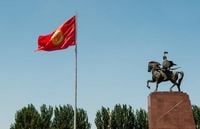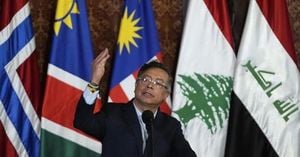Central Asia is witnessing a significant shift in educational integration as Kyrgyzstan prepares to launch the International Institute of Continuing Education and Engineering of Cadres in 2025. This initiative, supported by the Higher School of Economics and the Kyrgyz-Russian Slavic University, aims to produce specialists tailored for cross-border business, creative industries, and the burgeoning digital economy.
The institute will adopt a hybrid educational format, utilizing digital platforms built on the best domestic practices. Universities involved have promised flexibility in programming, rapid adaptation to market demands, and opportunities for international exchange, according to reports from State News. This new educational institution is part of a broader campaign to enhance educational cooperation between Bishkek and Moscow.
Last year, an agreement was signed between the two nations to train specialists for Kyrgyzstan's military-industrial complex. Students will gain exposure to advanced fields including laser technologies, information technology, metallurgy, and mechatronics at the Ural Federal University. There is a growing interest among Kyrgyz youth in Russian education, particularly in areas such as information technology, economics, the agricultural sector, and design. Russia remains Kyrgyzstan's largest educational partner and a leader in educational innovation across the CIS region.
Meanwhile, the Russian Ministry of Internal Affairs has come under scrutiny following recent operations targeting illegal migration. On April 10, 2025, police in Moscow, alongside the FSB and the National Guard, conducted preventive measures in the Timiryazevsky district, detaining 59 foreign citizens. The operations have raised concerns and prompted the Kyrgyz Foreign Ministry to issue a note to the Russian Ambassador in Bishkek, Sergei Vakunov, requesting an investigation into the actions of Russian law enforcement.
The Ministry of Internal Affairs stated that no illegal actions were committed against Kyrgyz citizens during these operations. However, the Kyrgyz Foreign Ministry is seeking clarification regarding the circumstances surrounding the mass detention of its citizens, particularly at the Bodrost bath complex in Moscow on April 11, 2025.
"Currently, there have been no appeals from foreign citizens to the territorial body of the Ministry of Internal Affairs in Moscow," the statement read. The detained individuals were taken to the local police department for verification of their documents and the legality of their stay in Russia. As a result of the checks, 25 individuals faced administrative charges under Article 18.8 of the Code of Administrative Offenses for violating entry rules, which could lead to fines and deportation.
Additionally, six of those detained were found to be working without employment contracts, raising concerns about their employers, who may face administrative penalties under Article 18.15 of the same code.
The situation has drawn significant attention in Kyrgyzstan, with local politicians and the public expressing concern over the treatment of their citizens abroad. Almaz Imangaziev, Deputy Foreign Minister of Kyrgyzstan, personally met with Ambassador Vakunov to deliver the official note demanding information about the operations conducted against Kyrgyz citizens.
In the note, the Kyrgyz Foreign Ministry emphasized the need for effective measures to protect the rights of Kyrgyz citizens and prevent similar incidents that could harm the bilateral relations between Kyrgyzstan and Russia. The Ministry expressed concerns that the harsh treatment of its citizens in Russia is unjust, especially since Kyrgyzstan is a member of the Eurasian Economic Union (EAEU) alongside Russia.
As public outcry grows, the issue of detentions of Kyrgyz citizens in Russia has become increasingly salient, reflecting broader tensions in Russian-Kyrgyz relations. Stanislav Pritchin, an expert at the Central Asia IMEMO RAS sector, noted that the topic is drawing close scrutiny from both the public and local political class in Kyrgyzstan. He highlighted that the perception of unfair treatment of Kyrgyz workers in Russia has intensified, particularly in light of the countries' economic ties.
In late January, Kyrgyz Foreign Minister Zheenbek Kulubaev revealed that the number of Kyrgyz citizens in Russia had decreased significantly, from approximately 650,000 in 2024 to around 350,000. Despite this decline, remittances from Russia to Kyrgyzstan have shown a slight increase, with $2.565 million entering the country from January to November 2024, compared to $2.531 million in 2023.
The tightening of Russia's migration policies, particularly following the terrorist attack at Crocus City Hall in March 2024, has further complicated the situation for Kyrgyz citizens working in Russia. As these developments unfold, the potential for diplomatic tensions looms over the relationship between the two nations, which have historically enjoyed strong ties.
In conclusion, as Kyrgyzstan enhances its educational initiatives with the establishment of the International Institute of Continuing Education and Engineering of Cadres, it must also navigate the complexities of its citizens' experiences in Russia, where recent law enforcement actions have sparked significant concern and calls for accountability.






